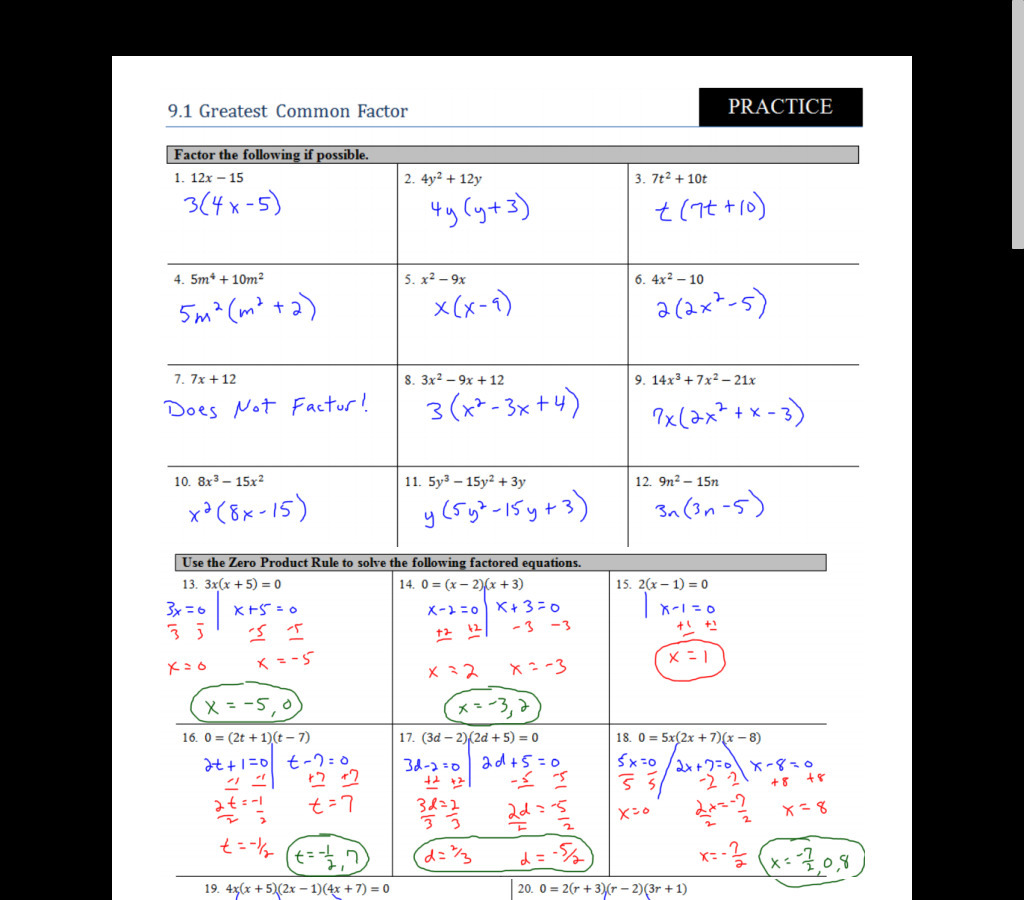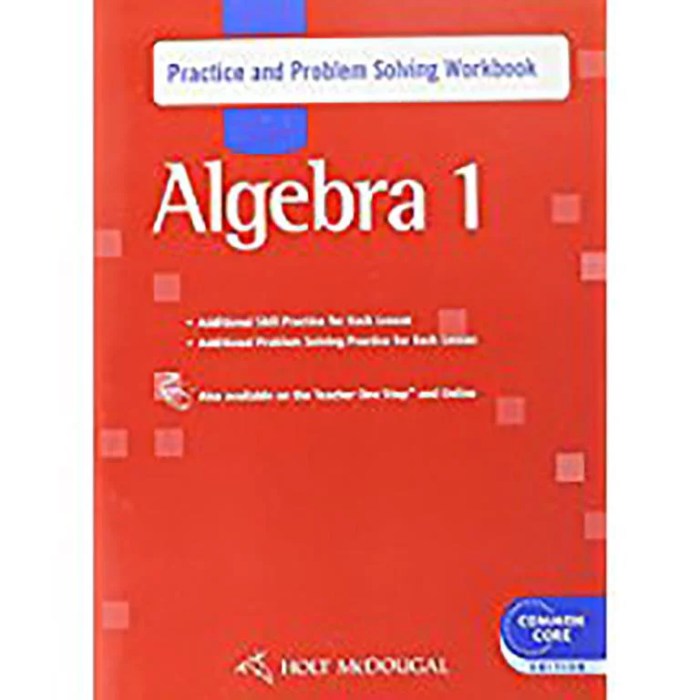Algebra 1 common core pdf – Dive into the world of Algebra 1 Common Core with our comprehensive PDF guide, tailored to empower students and educators alike. This resource delves into the intricacies of the subject, providing a clear understanding of key concepts and equipping you with effective teaching strategies.
From recommended textbooks to engaging lesson plans, this guide covers everything you need to know about Algebra 1 Common Core. Let’s unlock the secrets of this mathematical realm together!
Introduction to Algebra 1 Common Core

Algebra 1 Common Core is a foundational mathematics curriculum designed to equip students with the essential algebraic concepts and skills necessary for success in higher-level mathematics and various STEM fields.
The curriculum emphasizes problem-solving, critical thinking, and mathematical modeling, providing students with a solid understanding of algebraic structures, functions, and equations.
Key Concepts and Skills
Algebra 1 Common Core covers a wide range of topics, including:
- Expressions and Equations: Simplifying, solving, and graphing linear equations and inequalities.
- Functions: Understanding the concept of functions, graphing linear and quadratic functions, and analyzing their properties.
- Systems of Equations: Solving systems of linear equations using various methods, such as substitution, elimination, and matrices.
- Exponents and Radicals: Understanding exponents, simplifying radical expressions, and solving radical equations.
li>Polynomials: Performing operations on polynomials, factoring polynomials, and solving polynomial equations.
Resources for Algebra 1 Common Core
Success in Algebra 1 Common Core requires access to high-quality resources. This section provides guidance on finding the best textbooks, online materials, and technology tools to support your learning journey.
Before you dive into the intricacies of Algebra 1 Common Core PDF, it’s worth noting that the person who pays the realtor, typically the seller, is the one who benefits from their expertise. Just like in math, where understanding the basics is crucial, knowing who compensates the realtor can clarify the dynamics of real estate transactions.
So, if you’re curious about Algebra 1 Common Core PDF, be sure to also explore the intriguing topic of quien le paga al realtor .
Recommended Textbooks
- Algebra 1 Common Core by Prentice Hall
- Algebra 1 Common Core by Glencoe
- Algebra 1 Common Core by Holt McDougal
- Algebra 1 Common Core by Saxon
- Algebra 1 Common Core by Big Ideas Learning
These textbooks align closely with the Common Core State Standards and provide comprehensive coverage of the curriculum.
Online Resources
- Khan Academy: Offers free video lessons, practice exercises, and assessments
- IXL Learning: Provides interactive practice problems and personalized learning paths
- Algebra.com: Features online lessons, quizzes, and games
- Purplemath: Offers detailed explanations of algebraic concepts and step-by-step solutions
- Math is Fun: Provides interactive games, puzzles, and videos to make learning algebra engaging
These online resources complement textbook learning and provide additional support for students of all levels.
Free and Low-Cost Materials
There are many free and low-cost resources available for Algebra 1 Common Core.
- OpenStax Algebra 1: A free online textbook that covers the entire curriculum
- Free Rice: An online game where users can donate rice to charities while practicing algebra
- Algebra Nation: A website that offers free online lessons, videos, and practice problems
- Your local library: Many libraries offer free access to online databases and resources
- Community colleges: Some community colleges offer free or low-cost tutoring services
These resources can help students access the support they need without breaking the bank.
Benefits of Technology
Technology can greatly enhance the learning experience in Algebra 1 Common Core.
- Interactive simulations: Allow students to visualize abstract concepts and explore mathematical relationships
- Online calculators: Provide instant feedback and help students check their work
- Graphing software: Enable students to plot functions and analyze data
- Virtual manipulatives: Offer hands-on experiences that support understanding
- Educational apps: Provide bite-sized learning opportunities and reinforce concepts
By embracing technology, students can make learning algebra more engaging, efficient, and effective.
Teaching Strategies for Algebra 1 Common Core
Effective teaching strategies for Algebra 1 Common Core focus on conceptual understanding, problem-solving, and communication. They involve engaging students in active learning, providing multiple representations of concepts, and differentiating instruction to meet the needs of diverse learners.
Engaging Lesson Plans and Activities
- Real-world problem-solving tasks:Present students with real-world scenarios that require them to apply algebraic concepts.
- Inquiry-based learning:Guide students through investigations that allow them to discover algebraic concepts and relationships.
- Technology integration:Utilize graphing calculators, dynamic software, and online simulations to enhance understanding.
- Group work and collaboration:Facilitate group activities that encourage students to share ideas, solve problems together, and learn from each other.
Differentiation for Diverse Learners, Algebra 1 common core pdf
To meet the needs of diverse learners, consider the following strategies:
- Tiered assignments:Provide assignments with varying levels of difficulty to accommodate different student abilities.
- Flexible grouping:Create heterogeneous groups for activities to allow students to learn from and support each other.
- Visual aids and manipulatives:Use concrete materials and visual representations to make concepts accessible to all learners.
- Modified assessments:Provide alternative assessment options, such as oral presentations or projects, to cater to students with different learning styles.
Assessment in Algebra 1 Common Core: Algebra 1 Common Core Pdf

Assessment in Algebra 1 Common Core is essential for evaluating student understanding, providing feedback, and informing instruction. It encompasses various types of assessments that measure students’ knowledge and skills.
Effective assessments are designed to:
- Measure student learning outcomes aligned with Common Core standards.
- Provide timely and meaningful feedback to students and teachers.
- Inform instructional decisions and identify areas for improvement.
Types of Assessments
Algebra 1 Common Core assessments include:
- Formative Assessments:Ongoing assessments that provide feedback during the learning process to identify areas of need and adjust instruction accordingly.
- Summative Assessments:Culminating assessments that measure student achievement at the end of a unit or course.
- Diagnostic Assessments:Assessments conducted at the beginning of a unit or course to determine students’ prior knowledge and skills.
Creating Effective Assessments
Creating effective assessments involves:
- Alignment with Standards:Assessments should measure the specific learning outcomes Artikeld in the Common Core standards.
- Clarity and Specificity:Instructions and assessment items should be clear and specific, leaving no room for ambiguity.
- Variety of Assessment Formats:Assessments should employ a variety of formats, such as multiple-choice questions, open-ended questions, and performance tasks, to assess different levels of understanding.
Using Data to Inform Instruction
Data from assessments should be analyzed to inform instructional decisions. This includes:
- Identifying Areas of Need:Assessment results can pinpoint areas where students need additional support or remediation.
- Monitoring Student Progress:Tracking student performance over time helps identify trends and inform adjustments to instruction.
- Evaluating Instructional Effectiveness:Assessment data can provide insights into the effectiveness of teaching methods and identify areas for improvement.
Professional Development for Algebra 1 Common Core
Professional development is crucial for educators to stay up-to-date on best practices and effectively implement Algebra 1 Common Core standards. Numerous opportunities are available to support educators in their professional growth.
Workshops and Conferences
Workshops and conferences provide a structured environment for educators to engage with experts, learn new strategies, and collaborate with peers. National and regional conferences, such as those organized by the National Council of Teachers of Mathematics (NCTM), offer comprehensive sessions on Algebra 1 Common Core topics, including instructional approaches, assessment techniques, and technology integration.
Online Resources
Online resources offer flexibility and convenience for educators seeking professional development. Websites like NCTM’s Illuminations and the Khan Academy provide a wealth of materials, including lesson plans, videos, and interactive exercises. These resources can supplement in-person workshops and conferences, allowing educators to access information at their own pace.
Collaboration
Collaboration among educators is a powerful tool for professional growth. By sharing ideas, experiences, and challenges, teachers can learn from each other and improve their teaching practices. School-based professional learning communities, online discussion forums, and social media groups provide platforms for educators to connect and support one another.
Essential FAQs
What is Algebra 1 Common Core?
Algebra 1 Common Core is a set of standards that define what students should know and be able to do in mathematics at the end of grade 8.
What are the benefits of using Algebra 1 Common Core?
Algebra 1 Common Core provides a consistent set of expectations for students across the country, ensuring that all students have access to a high-quality mathematics education.
How can I find free and low-cost materials for Algebra 1 Common Core?
There are many free and low-cost materials available online, including textbooks, worksheets, and lesson plans. Some popular resources include Khan Academy, Mathway, and IXL Learning.
